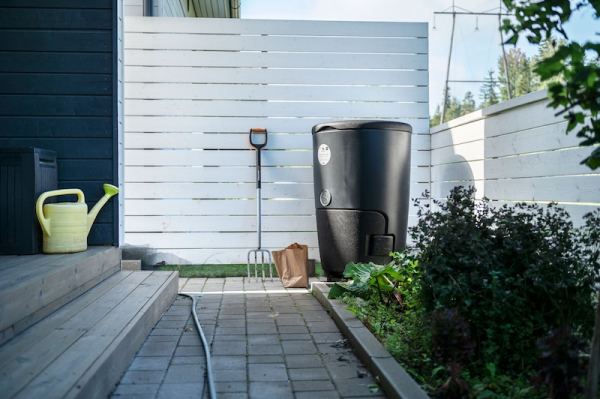Most compost units pass checks in Helsinki region, but 1 in 10 needs fixing

Most of the composters inspected at the properties were factory-made thermal composters. Photo: HSY/Roope Permanto
- Next Article Fewer Finns changing jobs despite active youth workforce
The Helsinki Region Environmental Services Authority (HSY) inspected nearly 1,000 composting units at residential properties over the summer and found that 90 percent met the required standards without issue.
The inspections were carried out between May and July across Espoo, Helsinki, Kauniainen, Kirkkonummi, and Vantaa. The checks focused on households that had registered composters for sorting food waste, as required by updated waste legislation.
Juho Nuutinen, operations manager at HSY, said most composting was well managed.
“We checked that composters contained food waste, did not emit odours, and that no leachate was draining into the surroundings. In general, we were satisfied. Residents are sorting their bio-waste properly and have learned how to use composters,” Nuutinen said in the release.
Most of the inspected composters were manufactured thermal composters. According to the regulations, composters intended for food waste must be ventilated and protected against pests.
The inspections followed changes to the Waste Act, which made separate collection of bio-waste mandatory for all residential properties. HSY introduced collection from properties with 1–4 dwellings between 2023 and 2024. Home composting is an accepted alternative but requires an official declaration to HSY.
Around 10 percent of properties were given correction requests. A total of 98 properties were flagged for follow-up after inspectors found either no composter on-site or unsuitable conditions for food waste composting.
The most common reasons for rejection included:
-
No composter found on the property
-
Composter lacked adequate protection from pests
-
Composter was not ventilated and emitted odours
-
Composter did not contain food waste
Two-thirds of the rejections were due to composters being absent or unsuitable for food waste. In some cases, composters were placed inside storage buildings and were not immediately visible, but in many cases, they had not been obtained at all.
“Properties with rejected results were given until the end of August to make corrections. We are now reviewing those cases and will contact residents if needed. If composting cannot be established properly, we will deliver a bio-waste bin to the property,” Nuutinen said.
Inspectors found that some residents misunderstood the purpose of composting. The goal of separate bio-waste collection is to remove food waste from mixed waste and convert it into raw material. HSY uses bio-waste to produce biogas and organic fertiliser, both considered important for national self-sufficiency. In home composting, the nutrients return directly to the soil.
“In some cases, composters only contained garden waste while food waste was still going into mixed waste. That’s not the idea. We also don’t require notification for garden waste composting alone. We need to communicate this more clearly,” Nuutinen added.
Composting is a biological process requiring oxygen, moisture, nutrients, and adequate temperature. Additives like wood chips or commercial dry mixes help air circulation and moisture control. Occasional stirring is also necessary.
HSY compost inspectors also provided on-site advice to residents. Guidance included tips on reducing smells and leachate, and HSY continues to offer free composting courses.
Residents were notified in advance by letter and text message. Most responded positively, and some even volunteered for inspections ahead of schedule.
HSY will continue compost inspections in summer 2026, refining the process based on this year’s results.
HT
- Next Article Fewer Finns changing jobs despite active youth workforce
Source: www.helsinkitimes.fi
